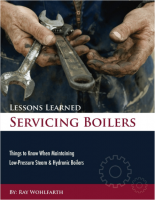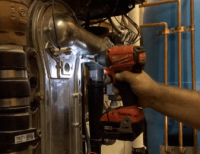Ray Wohlfarth, international author of Lessons Learned in a Boiler Room and Lessons Learned: Connecting New Boilers to Old Pipes, has a new book on the service of hydronic and low pressure steam boilers, entitled, Lessons Learned Servicing Boilers. The book is filled with almost 300 pages of tips, rules of thumbs, formulas, and jobsite Read more
service

Ray Wohlfarth, international author of Lessons Learned in a Boiler Room and Lessons Learned: Connecting New Boilers to Old Pipes, has a new book on the service of hydronic and low pressure steam boilers, entitled, Lessons Learned Servicing Boilers. The book is filled with almost 300 pages of tips, rules of thumbs, formulas, and jobsite anecdotes. It is a must have for anyone that maintains or services hydronic boilers. It is available at the following sites:
The book covers some of the following plus much more:
- Understanding Combustion Readings
- Leak Testing Gas Valves
- Trouble-shooting Boiler Controls
- Understanding Flame Safeguards
- How a Horse can Help with a Leaking Boiler
- Over 60 pages of heating formulas
- Can a flame actually conduct electricity?
- How can Alka Seltzer tablets be used as a boiler room alarm?
- How can a boiler with 4 times the level of carbon monoxide than another one be safer?
- Which is faster; Hot Water or Steam?
- How often should you test a boiler relief valve?
- Why does the radiator not heat all the way across?
- What is the difference between a safety and a relief valve?
- How do you size a gas train vent?
- What do the readings mean on a combustion analyzer?


Mod/Con goes 10 years without service The middle of July might not be the most common time of the year to perform annual boiler services but a recent “no hot water” service call had me scrambling for parts and time in the schedule to hopefully erase What turned out to be over ten years of Read more
Mod/Con goes 10 years without service
The middle of July might not be the most common time of the year to perform annual boiler services but a recent “no hot water” service call had me scrambling for parts and time in the schedule to hopefully erase What turned out to be over ten years of neglect.
You read that right, over ten years without service.
When I took the call I vaguely recalled the address of the home but knew that the owner was not the original; when I pulled down the long driveway into the woods I recalled installing the plumbing and in-floor heating [while working for my last employer] for the home. The new owner had purchased the home through a short sale and was eager to find a remedy to his lack of hot water and the mysterious, random explosion-like noises coming from the mechanical room.
You know that feeling as you stand outside a home or building you were at years prior, that sort of recalling of events or challenges? It only took me a minute to remember back to the time of its construction and that this place had over a mile of in-floor tubing along with a rather large (80 gallon) indirect. At the heart of the heating plant was an aluminum boiler; a series 1 aluminum boiler that, in my experience over the years has had me replacing whole heat exchangers, controls and sensors galore. As we introduced ourselves we walked downstairs while he described the issues he was aware of and his concern that the boiler may have never been touched since its original installation.
Our timing couldn’t have been better, as we entered the room the boiler was making an attempt to ignite on a call for DHW. Just a few minutes prior to my arrival the owner had reset the control from a soft lockout stemming from an ignition issue because there was no hot water for his shower. Ugh, I *hate it when that happens.
*Love. I love it when that happens. I need that to happen, we all do, its how we feed our families!
On what may have been its third or fourth attempt to fire up we were startled by the nearly room shaking explosion from within the combustion chamber. “That’s a safety issue and needs addressed immediately!” –were the first words out of my mouth as the owner explained that he had only been hearing that noise for a couple weeks. I guess what prompted him to call was the annoyance of having to walk downstairs into the basement to reset the boiler so he could shower. Nevertheless, I was there and already had a couple ideas of what was the problem.
The first place to start was to remove the ignitor; that gave me a tiny window of sight into the combustion chamber. However small it was, it was better than the completely opaque site glass mounted on the front of the heat exchanger. As it turns out, after pulling the igniter out, it was clear a couple calls would be needed for OEM parts to complete the necessary service. Here’s what I saw first:

Now I’m sure many of you reading this have experience cleaning heat exchangers but for those who have not performed this service I’ve put together a quick overview video of what it entails.
It should be noted that cleaning the combustion chamber of any gas appliance is a process that each manufacturer spells out clearly within their service manuals and through either in-person or online training/certification programs. The manual for this particular boiler states clearly that at the end of one year this service is required and then based on the findings at that time a judgment call by the trained professional is in order to determine cleaning intervals moving forward. Had this boiler been serviced properly at the one-year mark the expense of replacing the burner and added labor costs might have been avoided.
As an aside, I’ve been vocal about my thoughts on aluminum heat exchangers in other forums in the past. Considering the current operational state [after this service] of this particular boiler I’d have to give credit where credit is due. This thing has been neglected for a long time and it’s not only free of leaks but its also performing in the 90-93% efficient range. Not bad but, you can bet the owner signed a service agreement as he wrote out the check.
Eric Aune, Mechanical-Hub & Aune Plumbing
